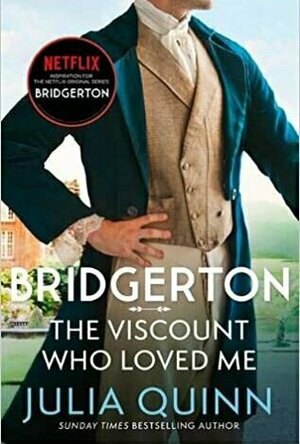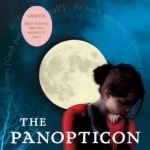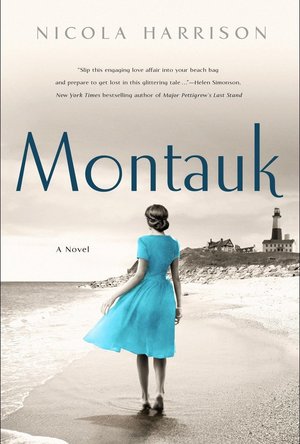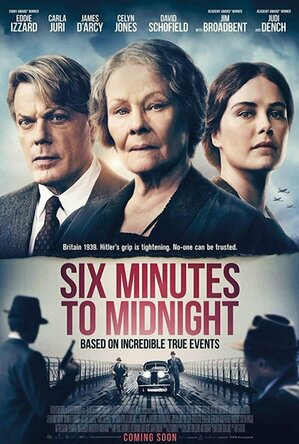Search
Search results
Lyndsey Gollogly (2893 KP) rated The Viscount Who Loved Me (Bridgertons, #2) in Books
Dec 8, 2023
189 of 235
Book
The Viscount who loved me ( Bridgertons 2)
By Julia Quinn
⭐️⭐️⭐️
1814 promises to be another eventful season, but not, This Author believes, for Anthony Bridgerton, London's most elusive bachelor, who has shown no indication that he plans to marry. And in all truth, why should he? When it comes to playing the consummate rake, nobody does it better...
-Lady Whistledown's Society Papers, April 1814
But this time the gossip columnists have it wrong. Anthony Bridgerton hasn't just decided to marry-he's even chosen a wife! The only obstacle is his intended's older sister, Kate Sheffield-the most meddlesome woman ever to grace a London ballroom. The spirited schemer is driving Anthony mad with her determination to stop the betrothal, but when he closes his eyes at night, Kate's the woman haunting his increasingly erotic dreams...
Contrary to popular belief, Kate is quite sure that reformed rakes to not make the best husbands-and Anthony Bridgerton is the most wicked rogue of them all. Kate's determined to protect her sister-but she fears her own heart is vulnerable. And when Anthony's lips touch hers, she's suddenly afraid she might not be able to resist the reprehensible rake herself...
I love Julia Quinn and this series has become so popular. I’ve managed to avoid the tv series as I always prefer to read the book first. And this was really good I enjoyed Anthony’s story, not as much as the first book but it was exactly what I expected.
Book
The Viscount who loved me ( Bridgertons 2)
By Julia Quinn
⭐️⭐️⭐️
1814 promises to be another eventful season, but not, This Author believes, for Anthony Bridgerton, London's most elusive bachelor, who has shown no indication that he plans to marry. And in all truth, why should he? When it comes to playing the consummate rake, nobody does it better...
-Lady Whistledown's Society Papers, April 1814
But this time the gossip columnists have it wrong. Anthony Bridgerton hasn't just decided to marry-he's even chosen a wife! The only obstacle is his intended's older sister, Kate Sheffield-the most meddlesome woman ever to grace a London ballroom. The spirited schemer is driving Anthony mad with her determination to stop the betrothal, but when he closes his eyes at night, Kate's the woman haunting his increasingly erotic dreams...
Contrary to popular belief, Kate is quite sure that reformed rakes to not make the best husbands-and Anthony Bridgerton is the most wicked rogue of them all. Kate's determined to protect her sister-but she fears her own heart is vulnerable. And when Anthony's lips touch hers, she's suddenly afraid she might not be able to resist the reprehensible rake herself...
I love Julia Quinn and this series has become so popular. I’ve managed to avoid the tv series as I always prefer to read the book first. And this was really good I enjoyed Anthony’s story, not as much as the first book but it was exactly what I expected.
Lyndsey Gollogly (2893 KP) rated All the fiends of hell in Books
Feb 13, 2024
27 of 220
Book
all the fiends of hell
By Adam L.G. Nevill
⭐️⭐️⭐️⭐️⭐️
The red night of bells heralds global catastrophe. Annihilation on a biblical scale.
Seeing the morning is no blessing. The handful of scattered survivors are confronted by blood-red skies and an infestation of predatory horrors that never originated on earth. An occupying force intent on erasing the remnants of animal life from the planet.
Across the deserted landscapes of England, bereft of infrastructure and society, the overlooked can either hide or try to outrun the infernal hunting terrors. Until a rumour emerges claiming that the sea may offer an escape.
Ordinary, unexceptional, directionless Karl, is one of the few who made it through the first night. In the company of two orphans, he flees south. But only into horrifying revelations and greater peril, where a transformed world and expanding race of ravening creatures await. Driven to the end of the country and himself, he must overcome alien and human malevolence and act in ways that were unthinkable mere days before.
I did not put this down! Another brilliant novel from the mind of Adam Nevill. I was on edge the whole time completely invested in the story and the characters. This brought about one of those situations I think we have all thought about and how we would survive. Your heart is fully pumping constantly at the thought of these creatures. Absolutely brilliant!!! I’ll certainly be concerned next time I see the sky red!
Book
all the fiends of hell
By Adam L.G. Nevill
⭐️⭐️⭐️⭐️⭐️
The red night of bells heralds global catastrophe. Annihilation on a biblical scale.
Seeing the morning is no blessing. The handful of scattered survivors are confronted by blood-red skies and an infestation of predatory horrors that never originated on earth. An occupying force intent on erasing the remnants of animal life from the planet.
Across the deserted landscapes of England, bereft of infrastructure and society, the overlooked can either hide or try to outrun the infernal hunting terrors. Until a rumour emerges claiming that the sea may offer an escape.
Ordinary, unexceptional, directionless Karl, is one of the few who made it through the first night. In the company of two orphans, he flees south. But only into horrifying revelations and greater peril, where a transformed world and expanding race of ravening creatures await. Driven to the end of the country and himself, he must overcome alien and human malevolence and act in ways that were unthinkable mere days before.
I did not put this down! Another brilliant novel from the mind of Adam Nevill. I was on edge the whole time completely invested in the story and the characters. This brought about one of those situations I think we have all thought about and how we would survive. Your heart is fully pumping constantly at the thought of these creatures. Absolutely brilliant!!! I’ll certainly be concerned next time I see the sky red!

Elpie Erectus
Book
On the verge of being murdered, a child vanishes, and her tormentors, arrested for her...
science fiction
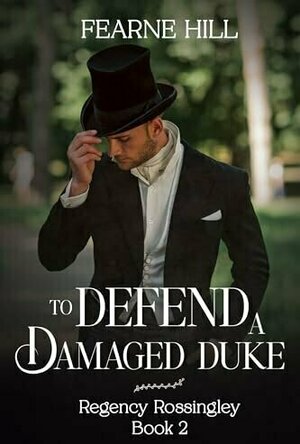
To Defend a Damaged Duke (Regency Rossingley #2)
Book
Benedict Fitzsimmons, the reclusive fourteenth Duke of Ashington, nurses a secret desire for his own...
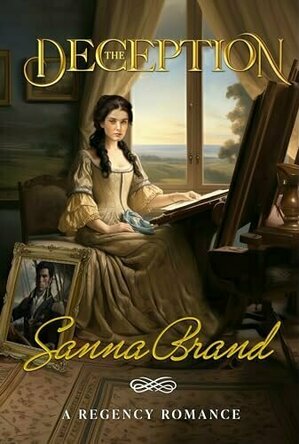
The Deception (The Secret Tales #2)
Book
A love forged through adversity…. Daughter of an illustrious artist, Lady Charlotte Pheland...
Historical Regency Romance
Mark @ Carstairs Considers (2470 KP) rated Murder at Marble House in Books
Nov 6, 2024
Unfortunate Fortune Teller Murdered
We are once again in August 1895 in Newport, Rhode Island. Emma Cross, society reporter for the local paper, has her morning interrupted when her distance cousin, Consuelo Vanderbilt calls begging for Emma to come over to Marble House. While Emma finds herself caught up in some family drama, the last thing she expects is that her visit will end in murder. But that’s just what happens when the fortune teller that Alva Vanderbilt has hired is found dead behind the estate. When a family member vanishes, Emma starts to investigate. Can she find out what happened?
This book picks up right after the last one ends. While it doesn’t spoil the murder itself, it does give away some ongoing storylines. The story presents an interesting mystery, but the pacing does get off at times. We get some developments in Emma’s personal life, and I’m not sure I’m on her side as much after some of what happened here. If I’m this opinionated, clearly, I’m finding the characters real, and that includes real people and fictional characters. Speaking of which, the author includes a bit about what is true and what she twisted to make her plot work, which I always appreciate. I read this book right after getting to visit Newport, which made it easier to picture some of the locations. I’m already wishing I’d had time to really explore the locations more when I was there. Overall, this is a good second entry, and I’m looking forward to the next in the series.
This book picks up right after the last one ends. While it doesn’t spoil the murder itself, it does give away some ongoing storylines. The story presents an interesting mystery, but the pacing does get off at times. We get some developments in Emma’s personal life, and I’m not sure I’m on her side as much after some of what happened here. If I’m this opinionated, clearly, I’m finding the characters real, and that includes real people and fictional characters. Speaking of which, the author includes a bit about what is true and what she twisted to make her plot work, which I always appreciate. I read this book right after getting to visit Newport, which made it easier to picture some of the locations. I’m already wishing I’d had time to really explore the locations more when I was there. Overall, this is a good second entry, and I’m looking forward to the next in the series.
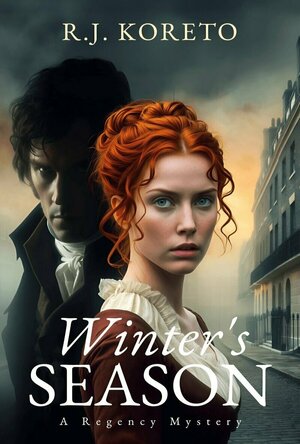
Winter's Season
Book
London, 1817: a city glittering with wealth and rotting with secrets. In the uneasy years after...
Historical Crime Politics Romance Thriller
Eilidh G Clark (177 KP) rated The Panopticon in Books
May 13, 2017
This is my all time favouurite book.
Jenny Fagan stated in an interview in 2013 that prior to writing the novel The Panopticon (2012) she had one question, ‘is it possible to achieve autonomy?’ Fagan explores this question throughout her novel with the character of Anais Hendrix. I would also suggest that the author is metaphorically exploring whether Scotland can achieve autonomy as an independent nation. Autonomy, in relation to the individual, is self-governance- or being able to decide for oneself
At the beginning of the novel, the fifteen-year old Anais is governed by the state. In contemporary British society, a child under the age of sixteen, regardless of her social situation is, by law, governed by an adult/s. Anais has lived her life in the care system with the exception of a short period in which she lived with an adopted mother. It is for this reason that she is able to see society from outside of the family unit. By creating the motherless child, Fagan presents Anais as the ‘other’ from both a societal perspective- ‘communities dinnae like no-ones,’ and from the viewpoint of the protagonist, ‘What they really want is me dead,’ (TP, p.23). Without a family, and through a lack of legitimate information regarding her birth mother, Anais believes that she was created in a lab:
I’M AN experiment. I always have been, It’s a given, a liberty, a fact. They watch me. Not just in school or social-work reviews, courts or police cells – they watch everywhere. […] They’re there when I stare too long or too clearly, without flinching. […] They watch me, I know it, and I can’t find anywhere any more – where they can’t see, (TP, Prologue).
Note that in the above quotation, the protagonist describes her assumed identity as a ‘liberty’. Liberty, in this case, means freedom from the oppressive nature of the family. Although Anais desires the nurturing aspect of the family, ‘I just want my mum,’ (Tp, p.269), her lack of family exposes her to the nature of contemporary society as a constant monitoring of civilians. In the above quotation, the repetition of ‘they’ suggests that she feels outside of the norm. The most important aspect of the above quote however, is that it is told from the protagonist’s thoughts. While Fagan gives Anais a certain amount of autonomy through both the first-person narrator, and the vernacular, the reliability of the narrator is increased by presenting the characters inner thoughts. While this limited autonomy is important, full autonomy is restricted by age. Bever suggests that ‘the capacity for individuals to become autonomous seems radically dependent on the contingent historical circumstances and societies into which they are born. Anais’ awareness of herself as the ‘other’ allows her an insight into the oppressive role of society, which is normally hindered in childhood due to the role of the family and it’s teaching of norms and values.
The sense of otherness can also be looked at in regard to Scotland and its role within the UK. The UK is a family of four countries under one state. Regardless of Scotland’s devolution, it has still to comply with a large amount of UK policies. Scotland has different values and goals to that of the UK making it ‘other’. With a different cultural identity to its neighbours, many Scottish citizens are seeking independence to protect its dwindling identity, whilst for others, independence is political.
Anais’ awareness of social control causes her a feeling of shrinking. This, according to her social workers is an identity problem:
Fifty odd moves, three different names, born in a nuthouse to a nobody that was never seen again. Identity problem? I dinnae have an identity problem – I dinnae have an identity, (TP, p.99).
Anais’ reaction in the above statement describes her lack of knowledge of her ancestry. I would argue that her identity is forced upon her from the fifty-one times that she has moved home, the care system, the solitary time in which she was adopted, the relationships she has had - both female and male, her friends but more importantly, from the unreliable account of her birth from the monk in the metal institution. The lack of family does not alter the fact that she is alive, and that all the fragments of her past make up an identity. For Anais, ‘Families are overrated […] ‘I umnay fooled. Not by families,’(TP, p.63-64). Like Anais, Scotland’s identity is ambiguous. Independence will allow Scotland political autonomy, however, within a global economy, Scotland still has limited autonomy. As culturally ‘other’ however, Scotland has already achieved autonomy with or without a state through its language, its people and its traditions.
Fagan demonstrates the difficulty of total autonomy though Anais and the birthday game, a game in which she creates her own identity. When she turns sixteen years of age, Anais is free from societal care and flees from her imprisonment, ‘I am Frances Jones from Paris. I am not a face on a missing-person poster, I am not a number or a statistic in a file. I have no-one watching me, […] I−begin today,’ (TP, p.323-324). ‘I’ suggests singularity and is still opposite to ‘them’ or ‘we’. Autonomy is therefore, ambiguous; Anais is still living within the same system under a false identity, she is therefore, segregated from everyone that she knows. Moreover, by changing Anais’ name to a name that ‘means freedom.’ (TP, p.323), Fagan is pointing out the difference between freedom and autonomy. Freedom is an emotive word, and there are two concepts of freedom – freedom from, which in Anais’ situation means freedom from the system of observation. Freedom to, however, is more problematic as Anais can never be free from the neoliberal system of rules and law – as Scotland would see in the case of independence. I would therefore conclude that Anais/Scotland has always has limited autonomy through cultural identity and history. I believe autonomy can only reside within the system through cultural and individual imagination and not out with it.
What does this mean for Scotland? If Scotland is part of the global community, can it become an autonomous nation? Is there a solution or should Anais/Scotland accept that cultural autonomy is imagined or self-contained. Can a collective identity and imagination change the political system? Finally, can culture survive without independence?
Bibliography
Crupp, Tyler, ‘Autonomy and Contemporary Political Theory’, in Encyclopaedia of Political Theory, ed. Mark Bevor (London: Sage Publications, 2010)
Fagan, Jenni, The Panopticon (London: Windmill Books, 2013), p.6.
Windmill Books. (2013). Granta Best Young British Novelist Jenni Fagan, . accessed 22 November 2015. Published on Apr 16, 2013
At the beginning of the novel, the fifteen-year old Anais is governed by the state. In contemporary British society, a child under the age of sixteen, regardless of her social situation is, by law, governed by an adult/s. Anais has lived her life in the care system with the exception of a short period in which she lived with an adopted mother. It is for this reason that she is able to see society from outside of the family unit. By creating the motherless child, Fagan presents Anais as the ‘other’ from both a societal perspective- ‘communities dinnae like no-ones,’ and from the viewpoint of the protagonist, ‘What they really want is me dead,’ (TP, p.23). Without a family, and through a lack of legitimate information regarding her birth mother, Anais believes that she was created in a lab:
I’M AN experiment. I always have been, It’s a given, a liberty, a fact. They watch me. Not just in school or social-work reviews, courts or police cells – they watch everywhere. […] They’re there when I stare too long or too clearly, without flinching. […] They watch me, I know it, and I can’t find anywhere any more – where they can’t see, (TP, Prologue).
Note that in the above quotation, the protagonist describes her assumed identity as a ‘liberty’. Liberty, in this case, means freedom from the oppressive nature of the family. Although Anais desires the nurturing aspect of the family, ‘I just want my mum,’ (Tp, p.269), her lack of family exposes her to the nature of contemporary society as a constant monitoring of civilians. In the above quotation, the repetition of ‘they’ suggests that she feels outside of the norm. The most important aspect of the above quote however, is that it is told from the protagonist’s thoughts. While Fagan gives Anais a certain amount of autonomy through both the first-person narrator, and the vernacular, the reliability of the narrator is increased by presenting the characters inner thoughts. While this limited autonomy is important, full autonomy is restricted by age. Bever suggests that ‘the capacity for individuals to become autonomous seems radically dependent on the contingent historical circumstances and societies into which they are born. Anais’ awareness of herself as the ‘other’ allows her an insight into the oppressive role of society, which is normally hindered in childhood due to the role of the family and it’s teaching of norms and values.
The sense of otherness can also be looked at in regard to Scotland and its role within the UK. The UK is a family of four countries under one state. Regardless of Scotland’s devolution, it has still to comply with a large amount of UK policies. Scotland has different values and goals to that of the UK making it ‘other’. With a different cultural identity to its neighbours, many Scottish citizens are seeking independence to protect its dwindling identity, whilst for others, independence is political.
Anais’ awareness of social control causes her a feeling of shrinking. This, according to her social workers is an identity problem:
Fifty odd moves, three different names, born in a nuthouse to a nobody that was never seen again. Identity problem? I dinnae have an identity problem – I dinnae have an identity, (TP, p.99).
Anais’ reaction in the above statement describes her lack of knowledge of her ancestry. I would argue that her identity is forced upon her from the fifty-one times that she has moved home, the care system, the solitary time in which she was adopted, the relationships she has had - both female and male, her friends but more importantly, from the unreliable account of her birth from the monk in the metal institution. The lack of family does not alter the fact that she is alive, and that all the fragments of her past make up an identity. For Anais, ‘Families are overrated […] ‘I umnay fooled. Not by families,’(TP, p.63-64). Like Anais, Scotland’s identity is ambiguous. Independence will allow Scotland political autonomy, however, within a global economy, Scotland still has limited autonomy. As culturally ‘other’ however, Scotland has already achieved autonomy with or without a state through its language, its people and its traditions.
Fagan demonstrates the difficulty of total autonomy though Anais and the birthday game, a game in which she creates her own identity. When she turns sixteen years of age, Anais is free from societal care and flees from her imprisonment, ‘I am Frances Jones from Paris. I am not a face on a missing-person poster, I am not a number or a statistic in a file. I have no-one watching me, […] I−begin today,’ (TP, p.323-324). ‘I’ suggests singularity and is still opposite to ‘them’ or ‘we’. Autonomy is therefore, ambiguous; Anais is still living within the same system under a false identity, she is therefore, segregated from everyone that she knows. Moreover, by changing Anais’ name to a name that ‘means freedom.’ (TP, p.323), Fagan is pointing out the difference between freedom and autonomy. Freedom is an emotive word, and there are two concepts of freedom – freedom from, which in Anais’ situation means freedom from the system of observation. Freedom to, however, is more problematic as Anais can never be free from the neoliberal system of rules and law – as Scotland would see in the case of independence. I would therefore conclude that Anais/Scotland has always has limited autonomy through cultural identity and history. I believe autonomy can only reside within the system through cultural and individual imagination and not out with it.
What does this mean for Scotland? If Scotland is part of the global community, can it become an autonomous nation? Is there a solution or should Anais/Scotland accept that cultural autonomy is imagined or self-contained. Can a collective identity and imagination change the political system? Finally, can culture survive without independence?
Bibliography
Crupp, Tyler, ‘Autonomy and Contemporary Political Theory’, in Encyclopaedia of Political Theory, ed. Mark Bevor (London: Sage Publications, 2010)
Fagan, Jenni, The Panopticon (London: Windmill Books, 2013), p.6.
Windmill Books. (2013). Granta Best Young British Novelist Jenni Fagan, . accessed 22 November 2015. Published on Apr 16, 2013
Breathtaking Historical Fiction; Must Read!
You can also find this review on my blog: bookingwayreads.wordpress.com
TRIGGER WARNINGS: rape, domestic violence, death, affairs, miscarriage
"You can only go so long pretending, acting as if you're someone you're not. Eventually you must return to who you are, who you were born to be. You can stray from it, try on other roles, other personalities, other beliefs, other lives, but eventually it will catch up with you and you have to return to the only person you can be."
Main Characters:
Beatrice Bordeaux - the main character, married to Harry Bordeaux. A bit of a feminist but it doesn't start showing until the middle to end of the novel. She's got a strong, compassionate, sweet personality. Her development was major and not at all what I was expecting.
Thomas - the lighthouse keeper. He's a simple man, compassionate and patient. Also unbelievably kind to all, no matter ethnicity, class, or gender.
Harry Bordeaux - cocky, self-conceded. Honestly, the most horrible person ever.
Dolly - hat maker who befriends Bea. She's sweet, independent, and an all around feminist.
Elizabeth - laundress for the Montauk Manor, befriends Bea. She's down-to-earth and a loving mother and wife.
"I felt rage and a hot determination side by side and that was something. That alone gave me hope. Something was better than numbness. Something was better than not caring, not dreaming, not daring."
Review:
**Possible spoilers ahead**
The story starts off in the year of 1938. The wealthy from New York City always head to the East Coast to an up and coming town called Montauk for the summer. Here, the wives stay in the luxurious Montauk Manor during the weekdays with their children and nannies, planning social events and relaxing, while the men head back to the city to work - only coming back to visit on the weekends.
Beatrice Bordeaux is one of the wives who ends up staying in Montauk for the summer. But she soon learns that her husband, Harry, would actually be leaving with the rest of the men during the week. Beatrice is taken aback, as the main reason why the couple took this vacation was to rekindle their cracking marriage. She was also hoping that the vacation would allow her and Harry to have alone time as she craved being a mother but has been eluded by pregnancy for the past five years.
Beatrice is forced to socialize with the other wives, even though she just wants to relax and read, so that Harry can gain a foothold for his investment interests. He thinks that if Beatrice can become buddy buddy with some of the more known in society women, that he can sizzle his way up to their husbands to get some funds to invest into Montauk. But, Beatrice quickly grows bored of the woman's talk of events that are more self-serving than they are generous. This is where Elizabeth, the Manor's laundress enters.
Elizabeth's down-to-earth nature gives Beatrice nostalgia of her life prior to meeting Harry. The two women befriend each other, even though it would be looked down upon if the other wives of the Manor found out. This doesn't stop Beatrice though.
As the novel progresses, Beatrice becomes disillusioned with her marriage and even finds out that Harry was not being the faithful husband he promised in his vows. The reader can see Harry's regression of interest towards Beatrice throughout the novel, and how he only seems to care about her when she is beside him at social gatherings. This causes Beatrice to start doing the things that she wants. Enter the handsome yet sensitive lighthouse keeper, Thomas.
Thomas is the complete opposite of Harry and as Beatrice's marriage drifts more and more apart, she takes her life into her own hands where she follows what her heart wants. But with the risk she's taking, major consequences that could take lives and ruin social standings follow. This is when Beatrice must decide whether to follow her heart or do what is right according to society.
Montauk is an interesting and beautifully written look back into history when women were expected to do what society told her to do. Questions were not asked, and one must be "happy" that she's being cared for by her husband, because "good wives" waited for orders from their husbands and always did what they wished. The author, Nicola Harrison, does an excellent job with captivating the history and superficial feel of society back in the late 30's. Even the descriptions of the lighthouse, manor, and fishing village created vivid images that circulated within my mind as I read.
Usually, when it comes to Historical Fiction novels, I've found that they can be very predictable. Montauk was not your average Historical Fiction novel, that's for sure. There were twists and turns that I was not expecting and the ending twist threw me for a major loop. The one problem that I do have with the overall story, was the last chapter and epilogue. It lacked the depth and detail that was interwoven throughout the rest of the story. But overall, I was fascinated and enthralled in the story of Montauk.
Character/ Story background and development -
It's there, one hundred percent there. The main character's and the side characters all have the development and background interwoven into the story, waiting to be dug out as you read. All of the development and background that took place within Montauk, actually made this novel great!
Plot -
At first, the plot and story was slow. It could have just been my skewed perspective of not liking Historical Fiction novels, but it eventually picked up; allowing the like/dislike scales to flip. I was really worried that I would DNF Montauk, but once the story started to get more in depth with the characters and background, I was taken on an emotional roller coaster of feels. And I will happily take that ride over and over again.
Spelling/ Grammatical errors -
I did not notice any spelling or grammatical errors that took away from the overall story. There were a slight few littered throughout, but they were so minor and hardly noticeable that it did no harm to count it against the author or publisher.
Enjoyment -
I can for sure say, that I 100% enjoyed every second I spent on Montauk. I don't typically like Historical Fiction novels, but Nicola Harrison does an amazing job not only making sure the information is correct, but the writing is well-thought out.
Overall -
This novel is a sucker punch to the emotions; it's honestly one of those novels that will be cherished forever because the story, the development, the plot, the background, the heartache and pain, it was all there. And it made this a breathtaking novel to read.
Do I recommend? -
159% yes! I highly recommend Montauk by Nicola Harrison.
"With the ocean surrounding me, I feel free and at peace with the world."
TRIGGER WARNINGS: rape, domestic violence, death, affairs, miscarriage
"You can only go so long pretending, acting as if you're someone you're not. Eventually you must return to who you are, who you were born to be. You can stray from it, try on other roles, other personalities, other beliefs, other lives, but eventually it will catch up with you and you have to return to the only person you can be."
Main Characters:
Beatrice Bordeaux - the main character, married to Harry Bordeaux. A bit of a feminist but it doesn't start showing until the middle to end of the novel. She's got a strong, compassionate, sweet personality. Her development was major and not at all what I was expecting.
Thomas - the lighthouse keeper. He's a simple man, compassionate and patient. Also unbelievably kind to all, no matter ethnicity, class, or gender.
Harry Bordeaux - cocky, self-conceded. Honestly, the most horrible person ever.
Dolly - hat maker who befriends Bea. She's sweet, independent, and an all around feminist.
Elizabeth - laundress for the Montauk Manor, befriends Bea. She's down-to-earth and a loving mother and wife.
"I felt rage and a hot determination side by side and that was something. That alone gave me hope. Something was better than numbness. Something was better than not caring, not dreaming, not daring."
Review:
**Possible spoilers ahead**
The story starts off in the year of 1938. The wealthy from New York City always head to the East Coast to an up and coming town called Montauk for the summer. Here, the wives stay in the luxurious Montauk Manor during the weekdays with their children and nannies, planning social events and relaxing, while the men head back to the city to work - only coming back to visit on the weekends.
Beatrice Bordeaux is one of the wives who ends up staying in Montauk for the summer. But she soon learns that her husband, Harry, would actually be leaving with the rest of the men during the week. Beatrice is taken aback, as the main reason why the couple took this vacation was to rekindle their cracking marriage. She was also hoping that the vacation would allow her and Harry to have alone time as she craved being a mother but has been eluded by pregnancy for the past five years.
Beatrice is forced to socialize with the other wives, even though she just wants to relax and read, so that Harry can gain a foothold for his investment interests. He thinks that if Beatrice can become buddy buddy with some of the more known in society women, that he can sizzle his way up to their husbands to get some funds to invest into Montauk. But, Beatrice quickly grows bored of the woman's talk of events that are more self-serving than they are generous. This is where Elizabeth, the Manor's laundress enters.
Elizabeth's down-to-earth nature gives Beatrice nostalgia of her life prior to meeting Harry. The two women befriend each other, even though it would be looked down upon if the other wives of the Manor found out. This doesn't stop Beatrice though.
As the novel progresses, Beatrice becomes disillusioned with her marriage and even finds out that Harry was not being the faithful husband he promised in his vows. The reader can see Harry's regression of interest towards Beatrice throughout the novel, and how he only seems to care about her when she is beside him at social gatherings. This causes Beatrice to start doing the things that she wants. Enter the handsome yet sensitive lighthouse keeper, Thomas.
Thomas is the complete opposite of Harry and as Beatrice's marriage drifts more and more apart, she takes her life into her own hands where she follows what her heart wants. But with the risk she's taking, major consequences that could take lives and ruin social standings follow. This is when Beatrice must decide whether to follow her heart or do what is right according to society.
Montauk is an interesting and beautifully written look back into history when women were expected to do what society told her to do. Questions were not asked, and one must be "happy" that she's being cared for by her husband, because "good wives" waited for orders from their husbands and always did what they wished. The author, Nicola Harrison, does an excellent job with captivating the history and superficial feel of society back in the late 30's. Even the descriptions of the lighthouse, manor, and fishing village created vivid images that circulated within my mind as I read.
Usually, when it comes to Historical Fiction novels, I've found that they can be very predictable. Montauk was not your average Historical Fiction novel, that's for sure. There were twists and turns that I was not expecting and the ending twist threw me for a major loop. The one problem that I do have with the overall story, was the last chapter and epilogue. It lacked the depth and detail that was interwoven throughout the rest of the story. But overall, I was fascinated and enthralled in the story of Montauk.
Character/ Story background and development -
It's there, one hundred percent there. The main character's and the side characters all have the development and background interwoven into the story, waiting to be dug out as you read. All of the development and background that took place within Montauk, actually made this novel great!
Plot -
At first, the plot and story was slow. It could have just been my skewed perspective of not liking Historical Fiction novels, but it eventually picked up; allowing the like/dislike scales to flip. I was really worried that I would DNF Montauk, but once the story started to get more in depth with the characters and background, I was taken on an emotional roller coaster of feels. And I will happily take that ride over and over again.
Spelling/ Grammatical errors -
I did not notice any spelling or grammatical errors that took away from the overall story. There were a slight few littered throughout, but they were so minor and hardly noticeable that it did no harm to count it against the author or publisher.
Enjoyment -
I can for sure say, that I 100% enjoyed every second I spent on Montauk. I don't typically like Historical Fiction novels, but Nicola Harrison does an amazing job not only making sure the information is correct, but the writing is well-thought out.
Overall -
This novel is a sucker punch to the emotions; it's honestly one of those novels that will be cherished forever because the story, the development, the plot, the background, the heartache and pain, it was all there. And it made this a breathtaking novel to read.
Do I recommend? -
159% yes! I highly recommend Montauk by Nicola Harrison.
"With the ocean surrounding me, I feel free and at peace with the world."
Bob Mann (459 KP) rated Six Minutes to Midnight (2021) in Movies
Apr 4, 2021 (Updated Apr 4, 2021)
Historical story (Potential for a great film) (1 more)
Judi Dench
B-grade spy caper antics (1 more)
Some ridiculous plot-points
A "39 Steps-esque" thriller that doesn't match its potential
In "Six Minutes to Midnight", it's the summer of 1939 (so we are in a parallel time-flow here with the events of "The Dig"). A private girl's school - the Augusta Victoria College in Bexhill-on-Sea - is run with loving care by the spinster Miss Rocholl (Judi Dench). But the 'finishing school' is unusual, in that all its teenage students are German. Indeed, they are the offspring of prominent Nazis.
When half-German English teacher Thomas Miller (Eddie Izzard) applies for a suddenly vacant position, he is taken on to share the teaching duties with Rocholl and Ilse (Carla Juri). But in snooping into the activities going on there, he finds mystery and danger.
Positives:
This is a fascinating premise for a movie that will appeal to an older generation, along the lines of "They don't make them like this anymore". It has elements of the 'good guy on the run' that struck parallels with "The 39 Steps" for me.
It's great that the school is all based on historical fact. Miss Rochol did indeed run the school, as a part of a plan to infiltrate British high-society with pro-Nazi sympathies ahead of an invasion. In real-life, one of the pupils was the god-daughter of Heinrich Himmler and one - Bettina von Ribbentrop - was the daughter of the German foreign minister.
After a comic "Family Guy"-style set of production logos to kick off with (for a full one and a half minutes!!), the pre-title sequence is a superb scene-setter. What exactly is going on here? A frantic scrabbling in a bookcase. A pier-end disappearance. The school badge (a genuine reproduction!) with its Union flag and Nazi Swastika insignia. The girls performing a ballet-like ritual on the beach with batons. (This looks to be a cracker, I thought).
Judi Dench. Superb as always.
Chris Seager does the cinematography, and impressively so. Most of Seager's CV has been TV work, so it must be delightful to be given the breadth of a cinema screen to capture landscapes like this.
I like the clever title: "Six Minutes to Midnight". I assumed it was intended solely to reflect the imminence of war. But it actually has another meaning entirely.
Negatives:
For me, was a highly frustrating film. All of the great credibility and atmosphere it builds up in the first 30 minutes, it then squanders by diving off into sub-Hitchcock spy capers.
Izzard becomes a 'man on the run', and doesn't seem credible at that. (I appreciate the irony of this statement given that this is the man who ran 32 marathons in 31 days for charity!) But Izzard is built for distance and not for speed, and some of the police chase scenes in the movie strain credibility to breaking point. Another actor might have been able to pull this off better.
There's a lack of continuity in the film: was it perhaps cut down from a much longer running time? At one point, Miller is a wanted murderer with his face plastered on the front pages. The next, kindly bus driver Charlie (Jim Broadbent) is unaccountably aiding him and Rochol seems to have assumed his innocence in later scenes.
Various spy caper clichés are mined to extreme - including those old classics 'swerve to avoid bullets'; 'gun shot but different gun'; and 'shot guy seems to live forever'. And there are double-agent 'twists' occurring that are utterly predictable.
A very specific continuity irritation for me was in an 'aircraft landing' scene. Markers are separated by nine paces (I went back and counted them!) yet a view from a plane shows them a 'runway-width' apart. This might have escaped scrutiny were it shown just once. But no... we have ground shot; air shot; ground shot; air shot..... repeatedly!
Summary thoughts: This was one of the cinema trailers that most appealed to me over a year ago, in those heady days in the sunlit-uplands of life before Covid-19. It's a movie that showed a great deal of promise, since the history is fascinating. And there is probably a really great TV serial in here: showing the 'alternate history' consequences of these high-society German girls penetrating British society and steering the war in a different direction (screenplay idea (C) RJ Mann!) But the potential is squandered with a non-credible spy caper bolted onto the side.
So with "Six Minutes to Midnight", Downton-director Andy Goddard has made a perfectly watchable 'rainy Sunday afternoon' film, that I enjoyed in part for its 'old-school' quirkiness. But it's frustrating that all the promise couldn't be transitioned into a more satisfying movie.
(For the full graphical review, please check out the One Mann's Movies review here https://bob-the-movie-man.com/2021/04/04/six-minutes-to-midnight-a-39-steps-esque-thriller-but-not-quite-pulling-it-off/. Thanks).
When half-German English teacher Thomas Miller (Eddie Izzard) applies for a suddenly vacant position, he is taken on to share the teaching duties with Rocholl and Ilse (Carla Juri). But in snooping into the activities going on there, he finds mystery and danger.
Positives:
This is a fascinating premise for a movie that will appeal to an older generation, along the lines of "They don't make them like this anymore". It has elements of the 'good guy on the run' that struck parallels with "The 39 Steps" for me.
It's great that the school is all based on historical fact. Miss Rochol did indeed run the school, as a part of a plan to infiltrate British high-society with pro-Nazi sympathies ahead of an invasion. In real-life, one of the pupils was the god-daughter of Heinrich Himmler and one - Bettina von Ribbentrop - was the daughter of the German foreign minister.
After a comic "Family Guy"-style set of production logos to kick off with (for a full one and a half minutes!!), the pre-title sequence is a superb scene-setter. What exactly is going on here? A frantic scrabbling in a bookcase. A pier-end disappearance. The school badge (a genuine reproduction!) with its Union flag and Nazi Swastika insignia. The girls performing a ballet-like ritual on the beach with batons. (This looks to be a cracker, I thought).
Judi Dench. Superb as always.
Chris Seager does the cinematography, and impressively so. Most of Seager's CV has been TV work, so it must be delightful to be given the breadth of a cinema screen to capture landscapes like this.
I like the clever title: "Six Minutes to Midnight". I assumed it was intended solely to reflect the imminence of war. But it actually has another meaning entirely.
Negatives:
For me, was a highly frustrating film. All of the great credibility and atmosphere it builds up in the first 30 minutes, it then squanders by diving off into sub-Hitchcock spy capers.
Izzard becomes a 'man on the run', and doesn't seem credible at that. (I appreciate the irony of this statement given that this is the man who ran 32 marathons in 31 days for charity!) But Izzard is built for distance and not for speed, and some of the police chase scenes in the movie strain credibility to breaking point. Another actor might have been able to pull this off better.
There's a lack of continuity in the film: was it perhaps cut down from a much longer running time? At one point, Miller is a wanted murderer with his face plastered on the front pages. The next, kindly bus driver Charlie (Jim Broadbent) is unaccountably aiding him and Rochol seems to have assumed his innocence in later scenes.
Various spy caper clichés are mined to extreme - including those old classics 'swerve to avoid bullets'; 'gun shot but different gun'; and 'shot guy seems to live forever'. And there are double-agent 'twists' occurring that are utterly predictable.
A very specific continuity irritation for me was in an 'aircraft landing' scene. Markers are separated by nine paces (I went back and counted them!) yet a view from a plane shows them a 'runway-width' apart. This might have escaped scrutiny were it shown just once. But no... we have ground shot; air shot; ground shot; air shot..... repeatedly!
Summary thoughts: This was one of the cinema trailers that most appealed to me over a year ago, in those heady days in the sunlit-uplands of life before Covid-19. It's a movie that showed a great deal of promise, since the history is fascinating. And there is probably a really great TV serial in here: showing the 'alternate history' consequences of these high-society German girls penetrating British society and steering the war in a different direction (screenplay idea (C) RJ Mann!) But the potential is squandered with a non-credible spy caper bolted onto the side.
So with "Six Minutes to Midnight", Downton-director Andy Goddard has made a perfectly watchable 'rainy Sunday afternoon' film, that I enjoyed in part for its 'old-school' quirkiness. But it's frustrating that all the promise couldn't be transitioned into a more satisfying movie.
(For the full graphical review, please check out the One Mann's Movies review here https://bob-the-movie-man.com/2021/04/04/six-minutes-to-midnight-a-39-steps-esque-thriller-but-not-quite-pulling-it-off/. Thanks).
